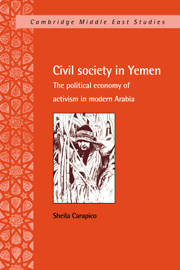Book contents
- Frontmatter
- Contents
- List of tables
- Preface and acknowledgments
- Note on transliteration and terminology
- List of abbreviations
- Map
- 1 Civil society in comparative perspective
- 2 Twentieth-century states and economies
- 3 Islam, tribes, and social services
- 4 Colonialism, activism, and resistance
- 5 Self-help, social capital, and state power
- 6 Unity, pluralism, and political participation
- 7 Civic responses to political crisis
- 8 Political movements, cultural trends, and civic potential
- Endnotes
- Glossary
- Bibliography
- Index
3 - Islam, tribes, and social services
Published online by Cambridge University Press: 02 December 2009
- Frontmatter
- Contents
- List of tables
- Preface and acknowledgments
- Note on transliteration and terminology
- List of abbreviations
- Map
- 1 Civil society in comparative perspective
- 2 Twentieth-century states and economies
- 3 Islam, tribes, and social services
- 4 Colonialism, activism, and resistance
- 5 Self-help, social capital, and state power
- 6 Unity, pluralism, and political participation
- 7 Civic responses to political crisis
- 8 Political movements, cultural trends, and civic potential
- Endnotes
- Glossary
- Bibliography
- Index
Summary
The trajectories of state and market operate on a historically derived socio-cultural base, or anterior social formation, that we normally refer to as “traditional” or “primordial” society. The purpose of this chapter is to explore this customary, or ahlī, character of society in its political and economic dimensions. The focus is not on historical developments per se but on change. As the ethnographic literature shows, traditions are variable and contested. The anterior social formation, where politics and economics are embedded in a Gemeinschaft, reacted to political and economic transformations by adapting customary mechanisms to bridge the gap between the primordial civic realm and modern Yemeni civil society. By and large, this was a struggle over creation and control of public social capital.
The argument here is that there was a discernible “primordial civic realm” wherein religious and tribal mechanisms provided for public welfare and protected public spaces. These mechanisms are of two sorts, tribal–communal and religious–philanthropic. To understand these mechanisms it is necessary to look at both their ideological and their material content. The ideologies of tribalism and Islam depict moral economies assigning rights and responsibilities to individuals according to their status, and they contain ideas about equality, election, consultation, even rights of dissent. Nonetheless, the material basis of the public welfare mechanisms is based at least in part on deprivation and exploitation. Not surprisingly, people did not cling all that tenaciously to conditions of scarcity and appropriation. Rather, once material conditions changed, they transformed indigenous welfare mechanisms and the morality on which they were supposedly based.
- Type
- Chapter
- Information
- Civil Society in YemenThe Political Economy of Activism in Modern Arabia, pp. 60 - 83Publisher: Cambridge University PressPrint publication year: 1998



